As the Government is poised to set out its policy on the future of England’s public woods and forests (Public Forest Estate)[1] – and on the Forestry Commission which manages them – an economic analysis carried out for Our Forests confirms that both the Public Forest Estate and the Forestry Commission represent excellent value for public money.
A financial review by the independent consultancy Eunomia[2] of the costs and benefits provided by the Public Forest Estate (PFE) shows that the Government’s original rationale for disposing of our public woods and forests and altering their management arrangements was completely flawed. The stated rationale behind the Government’s proposed disposal of England’s Public Forest Estate (PFE) in 2010/11 was to:
– reduce the burden on taxpayers;
– raise revenue by selling assets;
– withdraw from activities that (in the Government’s view) would be better done by others – be those ‘Big Society’, charitable bodies or private commercial interests.
Eunomia’s analysis is that none of the Government’s stated objectives would have been achieved by those plans. In contrast, the review found that:
- Public goods and services derived from the PFE outweigh running costs by at least 6 to 1 and according to Eunomia’s evaluation by a factor of 8 to 1;
- The Forestry Commission (FC) provides 1/3rd of all the benefits provided by England’s woods and forests from just 1/5th of the overall woodland area;
- Taxpayers already provide over £30 million annually in grants to private woodland owners, compared to the £12 million settlement provided to the FC to look after our public woods and forests ;[3]
- 70% of the FC’s management costs are met by revenues from timber and other commercial activities taking place in PFE woods and forests;
- Far from being ‘inefficient’, as implied by former Secretary of State, Caroline Spelman, the FC produces over 60% of all home-grown soft-wood timber from just 20% of England’s total woodland area – harvesting 90% of the annual potential ‘crop’ of softwoods and 44% of the hardwoods from PFE woods and forests – compared to 37% and 11% respectively from private woodlands.
None of this should be a surprise to Government, as its own Impact Assessment (IA) confirmed that the PFE as managed by the Forestry Commission delivers better value for money than would be likely to be achieved under different forms of ownership and management, “….the government may have to pay new owners more than they pay the FC at present for public goods.”[4]
The Independent Panel on Forestry, set up by the Government in response to the public furore over the disposal, acknowledges this problem in its recommendations report,
“The value of the benefits they [woods and forests] provide to people, nature and the economy has not been recognised in public policy and successive Governments have simply not seen them as a priority for public investment.” Adding that, “… much of their value, to society and nature in particular, does not lend itself to simple expression in pounds and pence”.[5]
Despite existing evidence of the significant public benefits provided by the Public Forest Estate in England and its own assessment of the costs to the taxpayer of disposing of it, the Government proceeded with its plans to end public ownership and management of any woods and forests in England – until forced by massive public opposition to halt them[6].
Tony Juniper for Our Forests’ and author of, ‘What has Nature ever done for us?’ [7] said,
 “Far from being a drag on the country’s finances our research shows how the Public Forests Estate delivers huge economic value to the nation, and in a highly cost-efficient manner. Should Ministers have succeeded in their ill-conceived plans to privatise the publicly-owned woodlands we would be worse off in several ways, not least financially.
“Far from being a drag on the country’s finances our research shows how the Public Forests Estate delivers huge economic value to the nation, and in a highly cost-efficient manner. Should Ministers have succeeded in their ill-conceived plans to privatise the publicly-owned woodlands we would be worse off in several ways, not least financially.
The old-school economists advising ministers need to catch-up with progressive economic thinking that recognises the ‘value’ of environmental capital and ecosystem services. Treasury ministers and others, who put dogma before data, need to do their sums properly and implement policies that reflect the new economic paradigm – Nature more than pays her way. As our review of the real world economics shows, ‘Money really does grow on trees’.
Uncertainty still hangs over the future of the Public Forest Estate. With the Treasury having the whip-hand in Government, the danger is that outputs that cannot be measured directly or monetised exactly will be dismissed as ‘nice to haves’, rather than being recognised as vital for underpinning local rural economies, sustaining our environment and benefiting society generally.
Against that backdrop, Our Forests commissioned Eunomia[8] to:
- Review the economic analysis conducted as part of an earlier public consultation on the future of the PFE;
- Assess whether the PFE represents value for money and merits public support;
- Consider the potential for the development of market and other mechanisms to capture benefits currently beyond the narrow appraisal of conventional economics.
Eunomia confirmed that our public woods and forests provide a wide range of goods and services, some but not all of which lend themselves to conventional accounting procedures. Therefore Our Forests believes that the Public Forest Estate should be retained in its entirety,[9] and continue to be managed for the public good by the Forestry Commission.
We also asked Eunomia to evaluate the economic merit and viability of our vision for England’s woods and forests, which proposes a near doubling of overall tree-cover by 2050. Eunomia concluded that there is enough land available to increase England’s tree-cover to 15% of total land area and there is the precedent of previous rates of planting to achieve that new ‘Domesday Forest’[10].
Our Forests has set out its vision for a long-term, sustainable future for the Public Forest Estate and all England’s woods and forests. We ask the Government to put forward its own vision for a positive, sustainable future for England’s trees, woods and forests – public and private. We look forward to supporting that.
But we put the Government on record – in our recent survey of 38 Degrees supporters and others, over 90% of those who responded said they would,
‘Campaign against the Government if their concerns about and hopes for England’s public woods and forests were not met’[11].
As far as Our Forests is concerned (our view is shared by many woodland communities and grassroots activists who fought to protect their local public woods and forests[12]) renewed public campaigning would be provoked by:
- The proposed ‘disposal’ of any PFE woods and forests until there is cast-iron, legal protection for the PFE overall and for all those woods valued and enjoyed by the public and communities across the country
- Any further cuts to the Forestry Commission’s budget and staffing or the annexing and amalgamation of its duties and activities by other bodies (public or private)[13].
Rich Daniels of Our Forests and Chair of HOOF commented,
“It would be unwise for Government to think that the disposal of any significant part of OUR public forests and woods would pass without reigniting the flames of protest in the hearts of people and forest communities across England. The prospect of any of our public woods and forests being threatened again after we have fought so hard to protect them will be met with even more determined campaigning.
As far as the Forest of Dean is concerned, continued management by the Forestry Commission is the only acceptable option for our community – over the years the FC has proven itself to be a highly-effective and sensitive manager of the forest for all the many interests that enjoy and use the Forest and through its Forest Design Plan ensured that local and national considerations are taken into account and balanced. Meddle with this at your peril, Minister!”
For further information contact:
Robin Maynard: 07932 040452
Tony Juniper: 07712 843207
Rich Daniels: 07717 750689
Jonathon Porritt: 01242 266777
Our Forests was formed to ensure that the views of the more than half a million people and myriad grassroots groups who rose up in opposition to the reprehensible plans to sell-off or otherwise dispose of the Public Forest Estate in England are fully understood and taken into account by the Coalition Government and its appointed ‘Independent Panel on Forestry Policy’.
Individual members, in alphabetical order, are:
Hen Anderson (Co-founder ‘Save Our Woods’, who also runs a smallholding and woodland on Exmoor)
Richard Daniels (Chair of the grassroots campaigning group Hands off our Forest (HOOF) in the Forest of Dean)
Dr Gabriel Hemery (chartered forester, co-founder and Chief Executive, the Sylva Foundation)
Tony Juniper (independent environmental advisor, campaigner, writer and former Director of Friends of the Earth)
Rod Leslie (former Chief Executive, Forest Enterprise)
Robin Maynard (environmental campaign consultant)
Jonathon Porritt (Founder Director Forum for the Future and former Chair of UK Sustainable Development Commission).
Domesday Forest – current planting rates are down to 2,500 hectares per year in England, compared to c. 6,500 hectares per year in the 1990s. However, Scotland has set a national planting target of 10,000 -15,000 hectares per annum, so creating 500,000 – 750,000 hectares of new woodland over the next 50 years. Translated to England, such a scale of ambition and planting would bring the country’s tree-cover back to around 15% of total land area, close to the woodland cover believed present at the time of the Domesday Book in 1086.
[1] The Government is due to set out its policy proposals and response to the report and recommendations from the Independent Panel on Forestry on January 31st.
[2] ‘The Economics of the Public Forest Estate and its Expansion’ by Dr Dominic Hogg and Thomas Vergunst, Eunomia 2012, available online at: www.eunomia.co.uk
[3] The overall deficit between income raised from the PFE and expenditure is £20 million – of which £12 million is provided by Defra as a public settlement, with the remaining £8 million raise through sales of ‘surplus’ land assets. Source: Independent Panel on Forestry final report – http://www.defra.gov.uk/forestrypanel/files/Independent-Panel-on-Forestry-Final-Report1.pdf
[4] Defra Impact Assessment (IA), Options for the disposal of the Public Forest Estate (See final published and earlier iterations). http://archive.defra.gov.uk/corporate/consult/forests/20110127-forestry-ia.pdf
[6] At the height of the public furore over the Government’s ‘disposal’ proposals for the whole of the PFE, some 534,000 people signed 38 Degrees’ on-line petition to ‘Save Our Forests!’ See: http://saveourwoods.co.uk/forest-campaigns-network/public-ready-to-rise-up-again-if-government-fails-them-over-public-woods-forests/
[9] Some modest disposals of land holdings that did not best fulfil or deliver the public good objectives of the PFE would be allowed to enable the Forestry Commission to adjust, refine and improve the overall benefits provided by the PFE.
[11] Public ready to rise up again if Government fails them over public woods & forests, http://saveourwoods.co.uk/forest-campaigns-network/public-ready-to-rise-up-again-if-government-fails-them-over-public-woods-forests/
[12] http://saveourwoods.co.uk/forest-campaigns-network/public-ready-to-rise-up-again-if-government-fails-them-over-public-woods-forests/
[13] The Forestry Commission in England is effective as the lead body responsible for managing our trees, woods and forests, and as such is best placed to provide policy steer to Government by virtue of its tri-partite role and structure:
- Practical forestry expertise through managing the PFE
- supporting the positive management of private woodland as expert advisor and grant-maker
- providing essential scientific advice, especially on the prevention and control of tree pests and diseases.
Structurally, the three distinct parts of the Forestry Commission: Forest Enterprise, Forestry Services and Forest Research make it greater than the sum of its parts. This vital ‘Additionality’ must be protected – not subsumed in some ill-advised, short-termist ‘super-quango’.





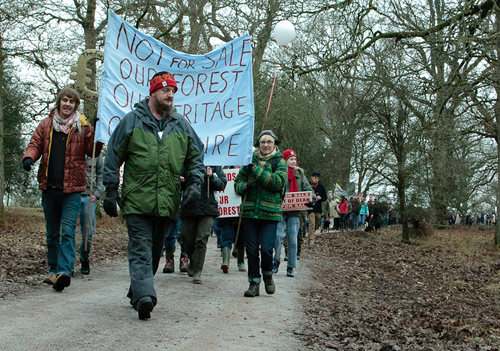
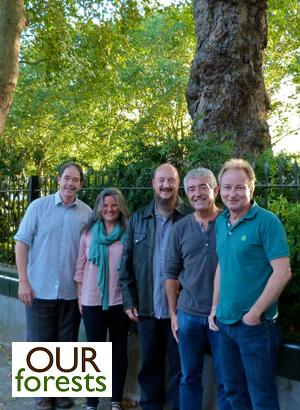









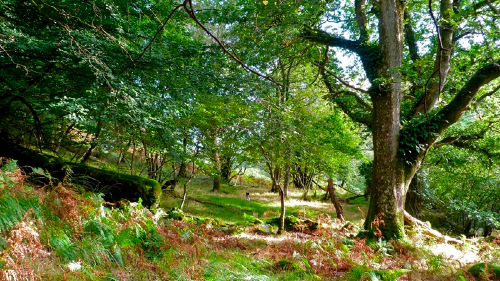
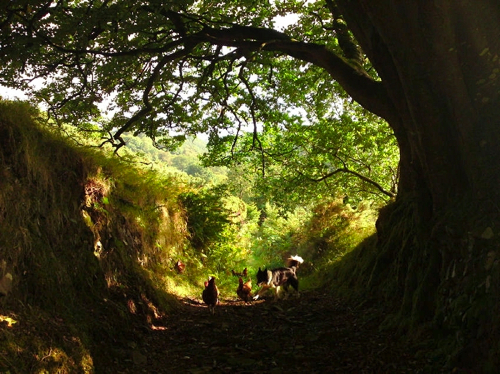


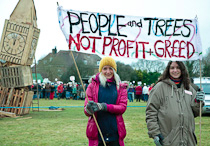


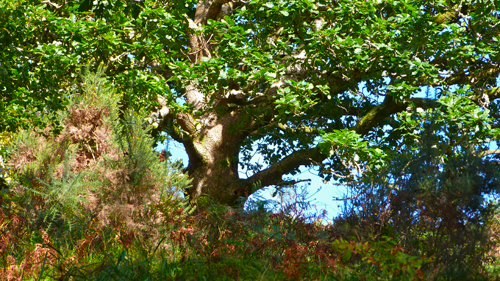






To Whom it may concern,
Two things: a comment and advice. First, congratulations on your success in keeping your forests from the money thieves!!!!!! Second, beware, dear England, of privatization. Here in the US., privatization schemes are destroying our country. Those who profess ethical motives are ALWAYS found to be the opposite. I know the trend for the last couple decades has been to hand over more of your public resources to those who wish to make a profit, but do not believe them when they tell you how you will benefit if they do. DO NOT BELIEVE IT!! Just think about what happened with your Skye bridge and the Private Investment Initiatives–BEWARE!!! God Love You and Peace Be to all.